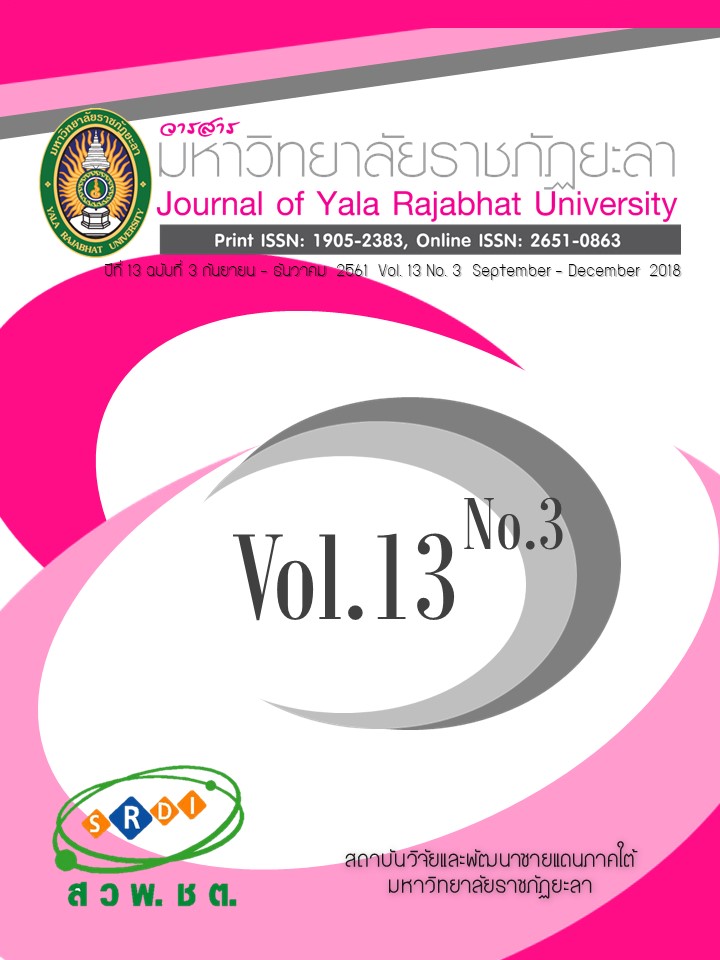เด็กที่มีความต้องการพิเศษในพื้นที่สามจังหวัดชายแดนใต้ : การดูแลภายใต้ระบบการศึกษาปรากฏการณ์การเป็นเด็กที่มีความต้องการพิเศษและความรู้ความเชื่อของผู้ปกครอง
Main Article Content
บทคัดย่อ
บทความนี้มีวัตถุประสงค์เพื่อเผยให้เห็นถึงการดูแลเด็กที่มีความต้องการพิเศษภายใต้ระบบการศึกษา ปรากฏการณ์ของการทำให้กลายเป็นเด็กที่มีความต้องการพิเศษและความรู้ความเชื่อของผู้ปกครองในการดูแลเด็กที่มีความต้องการพิเศษในพื้นที่สามจังหวัดชายแดนใต้ ดำเนินการศึกษาโดยการเข้าถึงเรื่องราวในสองส่วน ได้แก่ เอกสารและจากผู้มีประสบการณ์ตรงในการดูแลเด็กที่มีความต้องการพิเศษ ด้วยกระบวนการให้คำปรึกษาผ่านเรื่องเล่าประสบการณ์ชีวิตของผู้ปกครอง ครูและผู้ที่มีส่วนเกี่ยวข้อง รวมทั้งการสัมภาษณ์ การใช้แบบสอบถาม เพื่อให้ได้ข้อมูลอีกส่วนที่จะไปสบทบกับข้อมูลเอกสาร วิเคราะห์ข้อมูลโดยการตีความผ่านภาพสะท้อนประสบการณ์ชีวิตของผู้ปกครองและผู้ที่เกี่ยวข้องกับเด็กที่มีความต้องการพิเศษ ผลการวิจัยพบว่า การดูแลเด็กที่มีความต้องการพิเศษในพื้นที่สามจังหวัดชายแดนใต้ มิติแรก ครอบครัวที่ได้รับการศึกษาดี ทราบหลักการในการดูแลที่ถูกต้องดูแลบุตรหลานได้อย่างเหมาะสม มิติที่สองครอบครัวที่มีฐานะดีและความรู้ดีกับครอบครัวที่ฐานะยากจนและไม่มีความรู้ ทั้งสองประเภทนี้ ฐานคิดในการดูแลมาจากทัศนะที่ต่างกัน แต่การดูแลแบบเดียวกันคือปกปิดสังคมข้างนอก มิติที่สาม ครอบครัวมีความรู้ที่สามารถดูแลตนเองได้ ทราบหลักการในการดูแลแต่ฐานะยากจน ส่งผลให้ไม่สามารถส่งบุตรหลานไปโรงเรียนหรือไปบำบัดที่โรงพยาบาลได้ มิติที่สี่ ครอบครัวที่มีความเชื่อในโชคชะตาและพระผู้เป็นเจ้าซึ่งเป็นความเชื่อส่วนบุคคล ดูแลเด็กที่บ้านด้วยการเลี้ยงดูอย่างปกติสุข ไม่วิตกกังวล ด้วยหวังว่าบุตรหลานจะปกติเมื่อพระเจ้าต้องการ
Article Details
บทความ ข้อมูล เนื้อหา รูปภาพ ฯลฯ ที่ได้รับการเผยแพร่ในวารสารมหาวิทยาลัยราชภัฏยะลานี้ ถือเป็นลิขสิทธิ์ของวารสารมหาวิทยาลัยราชภัฏยะลา หากบุคคลหรือหน่วยงานใดต้องการนำทั้งหมดหรือส่วนหนึ่งส่วนใดไปเผยแพร่ต่อหรือกระทำการใดๆ จะต้องได้รับอนุญาตเป็นลายลักษณ์อักษรจากวารสารมหาวิทยาลัยราชภัฏยะลาก่อนเท่านั้น
เอกสารอ้างอิง
2. Juathai, J. (2008). The Construction of disable self Identities. Doctor of Education Degree in Development Education. Srinakharinwirot University. (in Thai)
3. Kaew Kangawan,S. (2003). Psychology Children with special effects. (2rd ed.). Bangkok: Moh-chao-Ban Publishing House. (in Thai)
4. Laorlurtluckkana, K., Chakkaew, W. & Phongsak, S. (2016). Parent’s Expectations in Regard to Administrative Learning for the Primary Level of Education in Lampang Province. Journal of Yala Rajabhat University, 11(1), 93. (in Thai)
5. Office of the basic Education Commission. (2010). The teacher performance evaluation Manual [Online]. Retrieved July 10, 2017, from: hrd.obec.go.th/Old/news/feb/224-6.doc. (in Thai)
6. Pipatpen, M. (2004). The Inclusion of Local Wisdom into Thai Schooling System. Doctor of Education Degree in Development Education. Srinakharinwirot University. (in Thai)
7. Ploychum, S. (1995). The General philosophy. Bangkok: Mahamakutraj college print. (in Thai)
8. Research Institution and learning development. (2008). The case study of Healthy School Medium secondary school. Bangkok: JNT. (in Thai)
9. Royal Academy. (2017). Knowledge [Online]. Retrieved December 12, 2017, from:
www.dictionar.sanook.com/search/dict-th-th-royal-institute. (in Thai)
10. Sueathongpan, P. (2013). The study of parent’s ability in livelihood skill of the intellectual disability Children school. Center of special education Nakhon Ratchasima University by using The encourage and involvement parent program. Master’s thesis of education. Nakhon Ratchasima University. (in Thai)
11. Suthamdee, C. & Suthamdee, J. (2017). Conceptual Framework of Human Resource Development of an Organization in the 21st Century. Journal of Yala Rajabhat University, 12(Special Issue), 171. (in Thai)
12. Tanomlikhitwong, J. (2016). Exploitation of Models for Caring Children With Special Needs in 3 Southern Border Provinces Through Counseling Process. Yala: Faculty of Education Yala Rajabhat University. (in Thai)
13. Wanchadee, T. (2008).The literacy study of parent’s ability to development the muscle of Intellectual disability children by using the training program for parent. Master’s thesis of education. (Special Education).Bangkok: Srinakharinwirot University. (in Thai)


